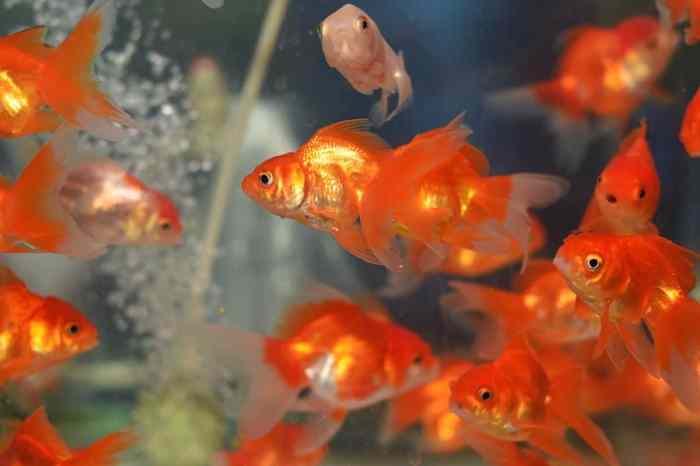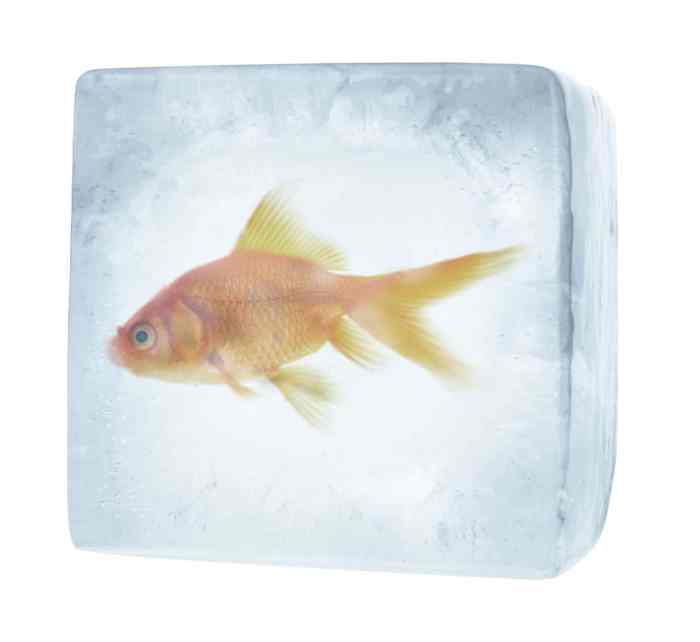Can goldfish survive in cold water? The answer, like many things in the world of fishkeeping, is a bit more nuanced than a simple yes or no. While goldfish are known for their resilience and adaptability, they are, at their core, tropical creatures who thrive in warm, stable environments.
Understanding the natural habitat and temperature tolerance of these fascinating creatures is crucial to ensuring their health and well-being.
Goldfish, originating from East Asia, have evolved to flourish in temperatures ranging from 68°F to 77°F (20°C to 25°C). Their physiology is finely tuned to this optimal range, with metabolic processes and bodily functions optimized for warm water. However, goldfish can adapt to slightly cooler temperatures, especially with gradual acclimation.
This adaptability is crucial for their survival in a changing environment, but it comes with limits.
Goldfish Biology and Temperature Tolerance

Goldfish, with their vibrant colors and graceful movements, are beloved aquatic pets worldwide. Their ability to thrive in a range of environments, including home aquariums, makes them a popular choice for fish enthusiasts. However, understanding the optimal temperature conditions for goldfish is crucial for their health and well-being.
This section explores the natural habitat of goldfish, their ideal temperature range, and the physiological adaptations that allow them to flourish in warm water.
Natural Habitat and Ideal Temperature Range
Goldfish, scientifically classified asCarassius auratus*, are native to East Asia, specifically China and Japan. Their natural habitat encompasses a variety of freshwater environments, including ponds, lakes, and slow-moving rivers. These habitats are characterized by moderate temperatures, typically ranging from 68°F to 77°F (20°C to 25°C).
This temperature range is considered ideal for goldfish, as it allows for optimal physiological function and growth.
Physiological Adaptations for Warm Water
Goldfish have evolved a number of physiological adaptations that enable them to thrive in warm water. These adaptations include:
- Efficient Respiration:Goldfish have a specialized respiratory system that allows them to extract oxygen from water efficiently, even in warm temperatures where oxygen levels may be lower. This adaptation is crucial for their survival in warm water, as warmer water holds less dissolved oxygen than colder water.
- Metabolic Regulation:Goldfish possess a highly efficient metabolism that enables them to maintain their body temperature within a narrow range, despite fluctuations in the surrounding water temperature. This adaptation is essential for their survival in warm water, as it allows them to regulate their internal environment and avoid overheating.
- Behavioral Adaptations:Goldfish exhibit behavioral adaptations that help them cope with warm water temperatures. For example, they may seek out cooler areas of their habitat during the hottest parts of the day or increase their activity levels to circulate water and maintain oxygen levels.
Consequences of Cold Temperatures
Exposing goldfish to extremely cold temperatures can have significant consequences for their health and well-being. These consequences include:
- Slowed Metabolism:As water temperatures drop, goldfish’s metabolism slows down, leading to reduced food intake and decreased activity levels. This can weaken their immune system and make them more susceptible to diseases.
- Hypothermia:If water temperatures fall below a critical threshold, goldfish can experience hypothermia, a condition in which their body temperature drops dangerously low. Hypothermia can lead to lethargy, loss of coordination, and even death.
- Stress and Disease:Exposure to cold temperatures can cause stress in goldfish, which can weaken their immune system and make them more susceptible to diseases. Cold temperatures can also promote the growth of harmful bacteria and parasites, further increasing the risk of infection.
Effects of Cold Water on Goldfish

Goldfish, like all cold-blooded animals, are highly susceptible to changes in their environment, particularly temperature fluctuations. When exposed to cold water, goldfish undergo physiological adaptations to maintain homeostasis, but prolonged exposure can pose significant health risks.
Physiological Responses to Cold Water
Goldfish respond to cold water by slowing down their metabolic rate, reducing their overall energy expenditure. This adaptation allows them to conserve energy and survive in colder environments. Their activity levels also decrease, as they become less active and spend more time resting.
This behavioral change further conserves energy.
Potential Health Risks Associated with Cold Water, Can goldfish survive in cold water
Prolonged exposure to cold water can lead to several health risks for goldfish.
- Hypothermia: As water temperatures drop, goldfish can experience hypothermia, a condition where their body temperature falls below the normal range. This can lead to lethargy, weakness, and ultimately, death. Hypothermia is a significant concern for goldfish kept in outdoor ponds during winter months.
- Slowed Digestion: Cold water slows down the digestive process in goldfish. This can lead to constipation, bloating, and a weakened immune system.
Survival Rate in Cold Water
The survival rate of goldfish in cold water depends on several factors, including the species of goldfish, the duration of exposure, and the specific water temperature. Generally, goldfish can tolerate temperatures down to 40°F (4°C) for short periods, but their ideal temperature range is between 68°F (20°C) and 72°F (22°C).
- Survival Rate: While goldfish can survive in cold water, their survival rate is significantly lower compared to their ideal temperature range. A study by the American Goldfish Society found that the survival rate of goldfish exposed to temperatures below 40°F (4°C) for extended periods was less than 50%.
- Species Variation: Certain species of goldfish, such as the Comet Goldfish, are known to be more tolerant of cold water than others. These goldfish have evolved to thrive in colder climates and can survive in temperatures as low as 35°F (2°C).
Cold Water Survival Strategies: Can Goldfish Survive In Cold Water
Goldfish, despite their reputation for being hardy, require careful management to thrive in colder temperatures. While they can survive in cold water, abrupt changes in temperature can be stressful and even fatal. Therefore, acclimating goldfish to colder water gradually is crucial.
Acclimation to Cold Water
Acclimating goldfish to colder water temperatures is a gradual process that minimizes stress and ensures their survival. The key is to mimic the natural temperature changes they would experience in their natural habitat.
- Start Slowly:Begin by lowering the water temperature by a few degrees Fahrenheit (1-2 degrees Celsius) every day. This gradual change allows the goldfish to adjust physiologically.
- Monitor Their Behavior:Observe the goldfish closely for any signs of stress, such as loss of appetite, lethargy, or erratic swimming. If you notice any of these symptoms, immediately slow down or stop the acclimation process.
- Target Temperature:Aim for a target temperature that is suitable for the specific goldfish species. For example, common goldfish can tolerate temperatures as low as 41°F (5°C), while fancy goldfish prefer slightly warmer temperatures around 50°F (10°C).
- Maintain Stable Conditions:Once the desired temperature is reached, ensure that it remains stable. Avoid sudden fluctuations, as these can be harmful to the goldfish.
Importance of Gradual Temperature Changes
Sudden shifts in water temperature can cause a range of health problems for goldfish, including:
- Shock:Rapid temperature changes can shock the goldfish’s system, leading to stress, weakened immune response, and increased susceptibility to diseases.
- Metabolic Disruption:Goldfish’s metabolic processes are sensitive to temperature fluctuations. Sudden changes can disrupt these processes, affecting their ability to digest food, regulate body temperature, and maintain overall health.
- Organ Damage:Extreme temperature shifts can damage internal organs, particularly the gills, which are responsible for oxygen absorption.
Role of Nutrition and Shelter
Proper nutrition and adequate shelter play crucial roles in helping goldfish survive in cold water.
- High-Quality Diet:During colder months, goldfish require a diet rich in protein and fats to maintain their energy levels and immune function. Offer high-quality commercial goldfish flakes or pellets specifically designed for cold water conditions.
- Reduced Feeding:As water temperatures decrease, goldfish become less active and their metabolism slows down. Reduce their feeding frequency to prevent overfeeding and water quality issues.
- Shelter:Provide ample hiding places and shelter for goldfish to escape the cold. Rocks, caves, and plants offer refuge and a sense of security.
Last Recap
In conclusion, while goldfish can survive in cold water for a limited period, it’s essential to prioritize their health and well-being by maintaining a stable, warm environment. Understanding their physiological needs and potential risks associated with cold exposure empowers fishkeepers to make informed decisions, ensuring their goldfish thrive in a comfortable and healthy environment.